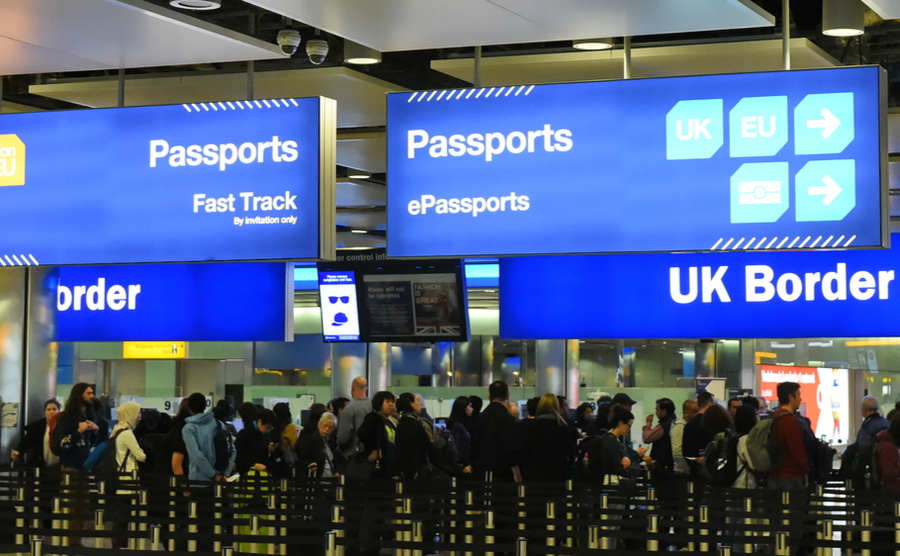Brexit and Greece - your need to knows

Let Smart take the risk out of your currency transfers
Whether you are buying a property abroad, making regular payments or sending money back to the UK, you will want to protect the value of your currency transfers from fluctuating exchange rates. That's where Smart Currency Exchange can help. We minimise the risk associated with transferring money overseas by providing expert guidance every step of the way.
Protect your currency costs
News update 3 December 2019:
What could a Conservative victory mean for your post-Brexit move?
Current polling suggests that the Conservatives will be returned next week with a commanding majority in parliament. What will that mean for those who are unable to gain residency in the EU before the end of the transition period?
The Conservative party plans a tightening up of the rules on EU immigration if it wins the election next week. It is widely expected that this would be reciprocated by European Union countries for British people moving to the EU.
It is widely expected that this would be reciprocated by European Union countries for British people moving to the EU
There are five main planks to their immigration plans, and either could affect buyers in Greece if reciprocated.
1. No difference between EU and rest of the world
The manifesto says: “We will treat EU and non-EU citizens equally. Regardless of whether they are from Europe or another part of the world, we welcome people who meet our criteria.” Anyone hoping, therefore, that some sort of special arrangement might operate between those countries where Brits and local people traditionally move, such as between Greece and the UK, may be disappointed.

A US-style ESTA system will operate between the UK and Europe
2. US-style ESTAs for travel to/from the EU
As outlined by Home Secretary Priti Patel this week, rather than being allowed to travel to the UK on a national identity card as at present, EU citizens will need (a) a biometric passport and (b) to have pre-approval. She said: “In future, EU citizens will require an Electronic Travel Authorisation prior to travel, much like the US ESTA system.”
The ESTA for the USA requires visitors to the USA to apply at least three days before their travel and to pay $14 for a card that lasts five years. Every person needs one, including children. Failure to do so means they get turned away at the border (or refused boarding to their flight). The USA isn’t alone in this. Canada has a similar system called the eTA, which costs C$7, while New Zealand’s version, the NZETA costs NZ$9.
All the above systems are easy to apply for within minutes online and though you do pay initially they last for several years.
They also plan to “count in and count out” EU citizens to ensure they can be identified if they overstay the three-month travel limits likely to be imposed.
3. A points-based immigration system
The Conservative manifesto says: “We will create bespoke visa schemes for new migrants who will fill shortages in our public services, build the companies and innovations of the future and benefit Britain for years to come.” The basis of an application will be an Australian-style points-based immigration system.
This is where you score points for how desirable the government sees you as an immigrant. In particular, they give priority to people who speak good English and have good qualifications. Will Greece impose a similar system on British retirees?

Home Secretary Priti Patel (Twocoms / Shutterstock.com)
4. Legal restrictions?
The Home Secretary said that the plans were intended to prevent terrorists and other dangerous criminals from entering the UK. However, could the UK, like the US, implement far more draconian restrictions? After all, the US immigration officials advise that people “who have been arrested, even if the arrest did not result in a criminal conviction, have a criminal record, certain serious communicable illness, have been refused admission into, or have been deported from, the United States, or have previously overstayed under the terms of the Visa Waiver Program…” will be prevented from automatic entry.
If similar rules are introduced to the UK, and reciprocated by the EU, could it a youthful indiscretion 40 years ago prevents you retiring to Greece?
5. Access to healthcare and benefits
The manifesto says that people coming into the country from the EU will only be able to access unemployment, housing, and child benefit after five years. This is the same as for people moving here from non-European Union countries. Bear in mind that under Theresa May the health secretary was suggesting that a continuation of the EHIC system would be possible. So this is quite the departure.
The good news: The good news is that many thousands of non-EU nationals live in Greece, with a variety of visa options.
Update: June 2019, ‘No deal’ Brexit still looks unlikely

Jeremy Hunt and Boris Johnson are slugging it out to become Prime Minister (Twocoms / Shutterstock.com)
The Conservative leadership race has narrowed to Boris Johnson and Jeremy Hunt, with the former currently the favourite to win the Conservative Party members’ ballot. This will be announced soon after 22 July. With both candidates generally considered to be on the centre of the party politically, the main bone of contention is who would be likely to get a result – any kind of result – on Brexit.
Both have said they would be willing to take the UK out of Europe with no deal. Boris Johnson said the UK would leave on 31 October “come what may, do or die”. However, he later declared that the chances of Britain leaving the European Union without a deal are “a million-to-one”.
Johnson has said he believes it is ‘perfectly feasible’ to renegotiate the Withdrawal Agreement with the European Union. That remains to be seen, but there is certainly an attempt at moving forward on some of the thornier issues surrounding the negotiations. The Alternative Arrangements Commission, a thinktank with the backing of a number of Conservative MPs, has published recommendations for avoiding the Irish backstop which, it claims, could be implemented within three years.
For his part, Jeremy Hunt has said that as a skilled entrepreneur and negotiator, who has managed to retain some respect among the EU27 leaders (unlike his opponent), he would have a better chance of getting the original Withdrawal Agreement changed by the EU, and then through the House of Commons.
Looking at the arithmetic of the Commons, there is also the possibilty that sufficient rebel Labour MPs will vote for the deal, rather than risk no deal or no Brexit. It also seems likely that various devices wil be adopted by the opposition parties and rebel Conservative MPs to block a no deal Brexit.
Which all leave us…
Assuming the above is true, we might be able to draw several conclusions.
No deal is still an unlikely outcome. However, even if that does happen, do overseas buyers really need to worry? The simple answer is no. We’ve explained before how you can move to Greece even in the event of a no-deal, but that actually looks more unlikely than the media would have you believe. It looks improbable that any Prime Minister could command a majority in the House to back a no-deal if it came to it.
If a deal or extension is cobbled together, the original implementation period allowed two years for those within the countries to sort out their affairs. It also allowed British people two years to move to the EU27 with all their EU rights. Clearly this cannot be guaranteed, but seems more likely than not.
Update: April 2019, Extension to 31 October offers breathing space
What does the 31 October deadline mean?
The other 27 nations of the EU have granted the UK a “flexible extension” to its membership of the EU until the 31 October. This means that if Theresa May gets her Withdrawal Agreement passed before then the UK will leave the EU earlier.
Both the Prime Minister and the EU seem to hope that it can be passed in time that the UK will not have to take part in the European elections on 22 May.
At the same time, the government has, according to most reports, now abandoned its No Deal planning as it believes that we will never leave the EU without a deal.
From the EU’s side, Jean-Claude Juncker said the EU was ready for No Deal. “We have adopted the necessary contingency measures and we are ready for a no-deal Brexit,” he told MEPs. However, since it is generally agreed in the UK parliament that this is the last option, we ca probably discount it for now.
Next stage of the process
There will be further talks between the government and Labour Party as soon as parliament returns from the Easter recess. If a compromise deal can be reached, MPs will vote on it. If passed, the UK will negotiate the amended deal with the EU and aim to leave as soon as possible. If MPs reject a deal worked out between Labour and the Government, the next stage is unclear.
If the talks break down, MPs will vote on another set of indicative votes before having to contest the elections. If a deal can be cobbled together we are once again set to leave. If not, we will either leave on 1 June without a deal, or we will take part in the European elections.
If we take part in the European elections, we are back to six main options:
- Passing Theresa May’s Withdrawal Agreement
- A full renegotiation of Brexit
- Another referendum
- Cancelling Brexit
- A General Election
- Leaving with no deal
- A combination of the above, such as the Withdrawal Agreement plus a comfirmatory referendum
What this means for property buyers
Holiday home-owners
For holiday home-buyers, whatever happens with Brexit their right to buy in Greece and spend a large proportion of the year there will be unaffected. Why? Because property ownership is not one of the “four freedoms” of the single market and anyone – even Americans, Australians etc – can buy.
Moreover, those “third country nationals” (as Americans, Australians etc are classified, and the British probably will be too) will be able to travel visa free to their property probably for up to six months of the year. They will probably have to take out private health insurance, however, and may not be allowed to work.
Retirees and relocators
There is possibility that “freedom of movement “ doesn’t end, either through Brexit being cancelled via a second referendum or by a softer version of Brexit. In which we will continue to be able to relocate to EU countries just as now.
Perhaps more likely, given that both the Government and Labour have committed to Brexit and ending freedom of movement, is that restrictions are put in place under some version of Brexit. That may mean British people can retire to the EU but not work. That’s the situation with other third country nationals such as from America and Australia.
Transition period
Had Theresa May’s deal passed, under the transition period, British people would have had until December 2020 – almost two years after Brexit – to establish residency in EU countries and retain all their EU rights. For life. And not just for them, but for their spouse and dependent family too.
The transition period will be implemented under any version of the deal – and presumably may be extended if we leave on 31 October beyond its original December 2020 date. So if you are planning to move to an EU country and wish to retain our right to free healthcare, to work, study and live just an any other EU citizen, you should have another 20 months at least to do so.
Update: 16 November 2018

Theresa May delivers her Brexit agreement, 14th November 2018
Deal or no deal: what does each mean for your property in Greece?
After Brexit, either with a deal or no deal, the British will be “third-country” nationals when viewed from Greece. But we won’t be the only ones. Property Guides has readers from Sydney to San Francisco, the UAE to Brazil, but it is only from the UK, lately, that readers have been worrying about healthcare, visas and buying property.
Why the worry? Greece Property Guides has delved deep into the likely Brexit scenarios – soft Brexit, hard Brexit or no deal – and we are confident that there are no realistic circumstances whereby British people need to abandon their dream.
British people will have (a) no problem buying property in Greece and (b) little extra difficulty or expense living there. Even with no deal. Here is how we reached those conclusions:
Property ownership is not one of the EU’s four freedoms and so your right to buy property in Greece will not affected.
Property
Ownership of property is not one of the EU’s four freedoms (goods, capital, work and services) and so your right to buy property in Greece will not be affected. That applies in whatever form Brexit happens, even with no deal.
Health
A Brexit deal should mean we can rule out worries over healthcare. The current plan, as outlined by the UK Health Secretary, is for the UK to continue the EHIC system and cover the cost of reciprocal healthcare in EU countries. This will cover British retirees and “those with chronic conditions, disabilities or other long-term conditions that require ongoing medical attention.”
A Brexit deal should mean we can rule out worries over healthcare.
In the event of no deal you may need health insurance until a new EHIC system can be worked out.
- If you’re NOT living in Greece full time, normal travel insurance should suffice.
- Those working in Greece will pay into the Greek social security system and will be covered.
- If you are on a long-term visa you may need comprehensive insurance. There is already a wide variety of options available for as little as €300 per month.
Visas
British people will automatically become ‘Third Country’ nationals in Greece. The good news is that European leaders have stated categorically that even with no deal people from the UK will not require a visa for visits of 90 days or fewer in every 180. So you can travel backwards and forwards as many times as you like.
If you stay for longer than that, you may need a visa.
Working: The British government says that EU citizens moving to work in the UK after the transition period will need a work visa. We can assume that would be reciprocated by Greece. If you need a work visa you will be just like the hundreds of thousands of non-EU people successfully working in the UK. If you want to, it is perfectly possible to learn Greek, get your UK qualifications recognised, and work in Greece. Why not give it a try?
Other options include investor visas, company transfers and the European Blue Card. There is also the Irish passport option. Over 10% of the British population qualifies for one, and the processes to apply are simple and inexpensive.
Retiring: Nothing has yet been announced about the “economically inactive” moving countries. A visa waiver system may be implemented as they won’t be taking jobs from local people. You may have to prove sufficient income to avoid being a burden on the state. We don’t know how much that will be in Greece, but in France it’s an income of €10,000 for one or €15,000 per couple.
Third country nationals need a visa if staying for more than 90 days in any 180. So you will be able to live in Greece for half the year.
Of course there may be paperwork involved – but we are confident that the processes will be simple and transparent, as they are for American and Australia buyers today. In short, even with no deal, there are many ways to get a visa for Greece, most of them are quite painless.
Your questions answered
“I’m buying a holiday home”
No problem. Nothing should change.
“I’m buying investment property”
Buy away, there will be no restriction.
“I’m retiring”
You may need a visa, but we expect it to be a simple system or visa waiver. There is also a ‘golden visa’ if you spend over a certain amount on a property.
“I’m just visiting my home!”
You will have no problem at all traveling to Greece. Other Third Country nationals such as Americans, Australians etc. don’t need a tourist visa for Greece, and we have had no reports of them being held up unduly at customs
Brexit positives
Not only are the potential problems with Brexit likely to have been seriously overblown, but there will be benefits too.
- The worries of so many British people about Brexit – we believe unfounded – have held back demand for overseas property. This is a great time to buy for those willing to fill in a couple of extra forms!
- Similarly, the evidence is that some Brits in Greece are returning to the UK, gaining from the weakness of the pound compared to pre-Referendum levels. This is a real opportunity to make an offer on under-priced property.
If you are ready to move to Greece, contact the Greece Resource Centre on 020 7898 0549 or email [email protected].
If you are still at the planning stage, download the Greece Buying Guide.
Update: 08 October 2018, What should you know about moving to Greece with six months to Brexit?
Greece Property Guides has had questions from some of our readers who are worried about Brexit impacting their chances of buying a home in Greece. Fortunately, the answer is that property isn’t affected by Brexit – so you can continue your plans safe in the knowledge that you can still buy here.
Brexit doesn’t impact property
Whether you’re allowed to own property or not in Greece isn’t controlled by the European Union. It is sometimes simpler in terms of paperwork, but ‘third-country nationals’ can still easily buy a home here outside of legally defined ‘sensitive’ areas around some border zones. Plus, many non-EU nationals, like Australians and Americans, can still stay in Greece for 90 days without a visa – so there’s no reason the same won’t apply to UK citizens.
Update: 24 September 2018, “No deal” advice through from government on pet travel and car insurance.
The UK government’s provided information on what we can expect in the case of a “no deal” Brexit for pet transport and car insurance.
UK nationals would need proof of third-party car insurance
If we leave the European Union without a deal, the UK will no longer be part of the ‘Green Card-free circulation area’. This means motorists will need to carry a Green Card to show proof of having car insurance. Normally, you should be able to request one from your insurance provider for free.
Motorists should expect documentation checks to take place upon entry to the Green Card-free area.
This is subject to agreements being reached between the UK Motor Insurers’ Bureau and those of other relevant countries.
“No deal” means live animals will require an EHC
Unless other rules are negotiated, anyone bringing a live animal from the UK – which will be outside the EU – into the EU will have to have an Export Health Certificate, signed by a vet or other authorising authority. They will have to go through an inspection process by Border Inspection Post and, after the inspection, the EHC would need to be signed by an ‘Official Veterinarian’.
For animals to be allowed to be exported to the EU, the UK would need to achieve ‘third-country’ status. If not, all exports would cease. However, other countries such as Australia have this status, so it seems likely.
Update: September 2018, Government offers “no deal” advice on passports, driving and roaming charges.
The UK government has announced what we can expect when travelling, driving and using mobiles in the EU after Brexit if the UK and EU don’t agree to a deal.
UK nationals may need at least three months’ validity on passports
UK citizens after Brexit will be considered as third-country nationals, ie as non-EU citizens. UK nationals entering a Schengen country (any EU country apart from Cyprus, Romania, Bulgaria and Croatia) will need to check their passports meet these conditions:
- Have an issue date no more than ten years before the date of entering a Schengen country
- Have at least three months before the passport expires
Third-country nationals can stay in a Schengen country for three months. As such, the government advises that the second requirement may in fact be for six months, to cover those three months within the Schengen area.
Roaming charges will fall to commercial decision-makers
If the UK exits the EU without a deal, it’ll be outside of the ‘Roam like at home’ rules. These allow EU citizens to use their data in any other EU country the same as in their home country.
UK operators will no longer be under the EU regulations if there’s no deal. This means they’ll be free to set their own surcharges – so it’ll come down to a commercial decision. However, Vodafone, EE, 3 and O2 have all confirmed they don’t have any intention to increase surcharges. Other operators have yet to commit.
UK licences may no longer be valid in the EU
The UK government has confirmed that UK driving licences may no longer be valid in the EU, if there is no deal agreed. In this case, the rules would default to International Driving Permits (IDP). The same as when UK citizens drive outside the EU, they’d have to apply for one of these before being able to drive.
There are two types of IDP.
The 1949 Geneva Convention on Road Traffic governs the first type. After the UK exits the EU, they would be valid in Ireland, Malta, Spain and Cyprus. They last for 12 months.
The second type is governed by the 1968 Vienna Convention on Road Traffic. The IDPs from this convention are valid for three years in all EU countries apart from those listed above. It’d also be valid in Norway and Switzerland.
Currently, the first type is available from the Post Office or directly from private companies. By the time the UK leaves the EU, both will be taken over by the UK government and available from the Post Office. When UK nationals travel to the EU, they’ll need their UK driving licence and IDP.
Update: June 2018, Government offers detail on citizens’ rights
- Home Secretary urges EU to speed up plans for UK expats in Member States
- UK government publishes plans and demands EU does same
- If you have previously lived abroad but returned to UK, you could retain rights
- UK government says it wants to secure reciprocal rights even if you move after Brexit.
- Even in the event of no final deal bring agreed, UK will follow through on citizens rights.
- No agreement on “onward movement” within EU.
UK announces residency plans, awaits EU response
Under plans from the UK government announced this week, the process by which EU citizens in the UK can apply to continue living here will amount to proving three simple questions: who are you, where do you live, do you have any (serious) criminal convictions. Moreover, they will be able to answer the questions via a mobile app or online, for example by taking a photo of their address. The authorities will then check this against existing databases.
The question is, will EU nations where the British live adopt similar rules and procedures?
The cost for their “settled status” application will be £65 or adults and £32.50 for children. EU citizens in the UK will be able to apply via the system from “the start of next year” up until at least June 2021, said the Home Secretary. The question is, will EU nations where the British live adopt similar rules and procedures?
The UK has been putting pressure on the EU to provide information on its planned procedures for UK nationals resident in the EU to secure their on-going residency status after Brexit. According to Home Secretary Sajid Javid, the European parliament’s Brexit co-ordinator, Guy Verhofstadt, has accepted that the EU’s 27 member states need to do more to reassure expat Britons in the EU about what to expect post-Brexit.
Reciprocal healthcare
A Government statement on Brexit also released this month should reassure expat pensioners concerned about their healthcare rights after Brexit. The government, highlighting how citizens’ rights to reciprocal healthcare remains a primary condition in any deal with Brussels.
Responding to recommendations raised by the House of Lords, the Government stated: “It has been clear that safeguarding the rights of EU citizens living in the UK and UK nationals living in the EU is a top priority. Through negotiations we have reached a fair agreement on citizens’ rights, grounded in reciprocity, which seeks to allow citizens to continue living their lives broadly as they do now.”
Indications are that both parties have found common ground on the issue of healthcare. “We have reached a reciprocal agreement in principle on healthcare arrangements to those UK and EU citizens who move countries during the implementation period,” continued the Government’s statement. “This was reflected in the updated draft Withdrawal Agreement text presented at the March European Council.”
Return to the Continent
The Government’s draft deal would accommodate Britons who have at some point lived in another EU country before the implementation period ends on 31 December 2020. “For example, a UK national who has worked for a year in Spain, but has returned to live in the UK prior to the end of the implementation period and retires to France upon reaching state pension age, could be covered for reciprocal healthcare in France when they export their state pension,” said the statement. “This would also include a UK national who is exporting a UK state pension to Spain at the end of the implementation period.”
No deal, no problem
Under the principle that “nothing is agreed until everything is agreed”, could all the rights and procedures agreed so far be abandoned? This was the question put by a House of Lords committee last week. In response the UK said this was unlikely: “providing certainty for citizens was a priority and we believe it would be unlikely for any deal on citizens’ rights agreed early on to be reopened.”
No onward movement agreement
Many British people already living in the EU, or about to move, have expressed concern that their rights are only based on the country where they reside. For example, a UK citizen resident in France will have no right to move to Spain, under current plans. The government could offer no help here, however, saying: “We understand that onward movement is an important issue for many UK nationals living in the EU, and the UK pushed strongly for this to be included during the first phase of negotiations. However, the EU made clear that it was not ready to include it in the Withdrawal Agreement.”
Healthcare for those who move after Brexit?
The UK government has acknowledged the fears of those who will not live in the EU before Brexit, and those who simply go on holiday, that the EHIC system will end. “We understand the importance of maintaining reciprocal healthcare arrangements for needs-arising treatment for those with chronic conditions, disabilities or other long-term conditions that require ongoing medical attention. This is why we have been clear that we want to continue with the EHIC scheme in any future agreement.”
However, they say this is a subject beyond the scope of the current talks and will be debated in the next phase of negotiations. The government has noted, however, that the UK does have arrangements with other non-EU countries, such as Australia and New Zealand. While these are generally only related to emergency healthcare, rather than the long-term conditions that many UK retirees in the EU suffer, the government says: “This demonstrates that reciprocal healthcare agreements are not dependent upon EU free movement rules.”

UPDATE: 19 March 2018. Transition deal agreed
The British and EU negotiating teams announced on 19 March 2018 that the UK’s transition period with the EU post-Brexit will continue to 31 December 2020. This extends by 21 months the period during which UK citizens can move to Greece and claim the same rights as before Brexit (see below). When you have become legally resident, which is a simple procedure (see below), you will retain your right to reside, work, study or open a business in Greece. You will also retain your rights to subsidised healthcare and a state pension.
The deal announced by the UK’s lead negotiator David Davis and the EU’s Michel Barnier means you should have longer than you first thought to move to Greece and receive the same EU rights as British expats who relocated pre-Brexit. We say “should” because as Mr Barnier said: “Nothing is agreed until everything is agreed.”

Michel Barnier (right) and David Davis. (Alexandros Michailidis / Shutterstock.com)
The deal could still unravel, but this seems highly unlikely. You can plan your new life in Greece with some confidence. After the official Brexit day on 29 March 2019, the UK will enter an ‘implementation phase’. This will last until 31 December 2020.
The transition phase will give you extra time to sort out your affairs, apply for Greek residency and find somewhere to live. There is no need for the panic that the March 2019 deadline had been creating for many of our readers.
It is especially good news for British people retiring to Greece in the next three years. If you retire in the UK you get a UK pension that you can transfer to Greece. It should be increased each year just like in the UK, according to the “triple lock”, in line with inflation, average earnings or 2.5%, whichever is greater. It also means that those with more complex and expensive health needs can move to Greece until 31 December 2020 knowing that their right to state healthcare benefits in Greece will continue for tier lifetime.
UPDATE: 1 February 2018. Transition deal will not include right to move
The Prime Minister Theresa May refused to allow the transition period, after the UK leaves the European Union in March 2019, to include the right to free movement of EU citizens to the UK. If reciprocated, it means that you have until 29 March 2019 to move to Greece.
Many of those thinking of moving to Greece are worried about any restrictions that may arise after Britain leaves the EU. Our most recent survey found that four out of every ten of our readers were worried by Brexit.
When news surfaced in December 2017 that an initial agreement had been reached – this not only sent the pound shooting up in value, but was also a very welcome Christmas present to the British people hoping for a long, affordable and relaxed life in Greece. The agreement spelled out the rights of people moving to Greece until March 2019: “There will be no change to the rights and status of UK nationals living in the EU while the UK remains in the EU.” Those rights will continue after the UK leaves.
It had also been assumed that this would be extended until December 2020 as part of the “status quo” transition period. However, last week Theresa May said, “I’m clear there is a difference between those who came prior to us leaving and those who will come when they know the UK is leaving.”

Theresa May made the comments while in China
This caused immediate outrage. Guy Verhofstadt, the European parliament’s Brexit coordinator, said: “Citizens’ rights during the transition is not negotiable. We will not accept that there are two sets of rights for EU citizens. For the transition to work, it must mean a continuation of the existing freedom with no exceptions.”
For British people wanting to move to Greece, it is clear that you must be living in the country before the UK leaves the EU on the 29th March 2019 or your rights to live in Greece without the need for a visa and with all your pension and other benefits intact may not be guaranteed.
The agreement in December essentially says the following:
• UK nationals who are lawfully residing in Greece by 29th March 2019, will be able to continue to reside in Greece.
• That includes children born or adopted outside Greece after the 29th March 2019.
• Close family members (spouses, civil partners and unmarried partners, dependent children and grandchildren and dependent parents and grandparents) will be able to join you in Greece after exit under these rules, so long as the relationship existed on 29th March 2019 and continues to exist when they join you in Greece.
• You and your family members can leave Greece for up to five years without losing your right to return.
• You and your family will continue to have the same access as you currently do to healthcare, pensions and other benefits.
Although this seems straightforward, the key phrase is “lawfully residing”. What do you need to do to be lawfully residing?
According to rules laid out by the European Union, from a fiscal point of view, you are automatically considered tax resident in Greece if your main home is there. You would also be considered resident if you spend 183 days in the country in any calendar year, or if your principal occupation is in Greece, or if Greece is the country of your most substantial assets.
If you are ready to buy in Greece, you’ll have a few financial matters to sort out. For advice on getting the best currency deal download the Property Buyer’s Guide to Currency.
The December agreement also laid out general arrangements on the procedures for proving residency for those living in Greece before March 2019: “EU27 Member States may require UK nationals and their family members covered by the agreement to apply to obtain a status conferring the right of residence and/or obtain a residency document. Administrative procedures for applications for status will be transparent, smooth and streamlined. Where an application is required to obtain status, UK nationals will have at least two years to submit their applications. Residence documents will be issued free of charge or for a charge not exceeding that imposed on nationals for the issuing of similar documents. Further information on these administrative procedures will be provided when available.”
Currently you do not need to register as resident in Greece. However, non-EU citizens do. To this end, we would recommend obtaining a residence permit as soon as you can. You will need to be able to prove a consistent income to sustain your life in Greece (such as bank or pension statements, or a certificate of employment), as well as medical coverage (proved by policy statements or similar) and a valid passport. Your local municipal office (dimos) or prefecture office (nomarxia) will accept applications – although there is no nationwide standard as to when or how these applications can be processed. In smaller towns you may find that you need to submit this at the police station.
You may find that any documents not in Greek must be translated in advance to ensure the swift transaction.
Family purchase could open the door
As a legal resident of Greece, your rights are extended to all dependent children and grandchildren, giving them the right to bring family to Greece as well in time. This opens up another angle for British people who wish to retain their EU rights but are not in a position to move to Greece yet. Only one person needs to be legally resident in Greece for the whole family to purchase property here – potentially spreading the cost among many. Read our brand new guide, Buying Abroad with Family to see how to organise the legal and financial aspects.
If you cannot buy before March 2019
If you are unable to establish legal residency in Greece before 29th March 2019, there are still options for you. The general consensus is that a new system will be put into place between British and EU citizens, given the proximity of the UK to the continent and the number of Brits that arrive in Greece every year. However, if this is not the case, it is probable that the rules that currently apply to Americans, Australians etc. will apply. These are essentially:
• Non-EU passport holders can visit for up to 90 days within a 180 day period. Citizens of some non-EU countries, including Americans and Australians can do this visa-free; this means they do not need to apply for a visa sticker. It remains to be seen whether the UK will also enjoy this benefit; if not you will need to submit an application to the Greek embassy in the UK for a visa.
• You can also apply for a long-stay visa, which allows you to stay in Greece without a residence permit. You must be able to prove you can support yourself while living there under this visa.
• There is no restriction on buying property in Greece, but you may need to explain what you will be using the property for.
• If you are working in Greece, you will need to apply for your visa within 30 days of arrival in the country.
• You can apply for Greek citizenship once you have been legally living in Greece for three years. You will need to pass an application, in Greek, provide a formal statement of naturalization and a photocopy of the passport.
• If you are retiring to Greece, you must prove how you will support yourself in the country (such as pension or savings).


